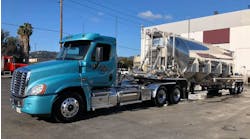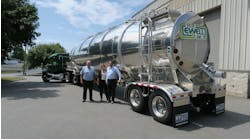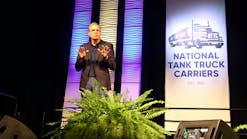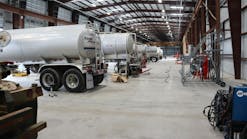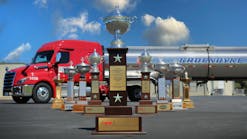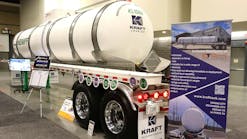WE HAVE said it before, and we will continue to say it: It would be a big mistake for the Pipeline and Hazardous Materials Administration (PHMSA) to hand off regulatory responsibility for cargo tanks to a non-governmental third party. But that is exactly what the agency is suggesting in HM-241, an advanced notice of proposed rulemaking (ANPRM) that was published in late December 2010.
It should be noted that there was nothing surprising or new in PHMSA's proposal. Bureaucrats at the agency have been trying to duck this important part of their cargo tank regulatory responsibilities since at least the 1990s. It was a bad idea then; and it is a bad idea today.
PHMSA officials claim they lack the technical expertise to continue writing regulations for the design, manufacture, operation, testing, inspection, repair, and maintenance of cargo tanks. They contend that the federal government can't afford to pay what it would take to attract top-caliber engineers with cargo tank experience.
It is hard to believe the agency can't find good engineers in today's high-unemployment environment. Besides, federal salaries and benefits grew at a much faster rate than the private sector over the past couple of years, which should make pay a much smaller issue.
Nevertheless, PHMSA seems determined to incorporate the American Society of Mechanical Engineers' (ASME) Section XII and the National Board Inspection Code (NBIC) into the 49 CFR hazardous materials regulations. This would essentially give control over the regulation-writing process to ASME and National Board.
A multitude of problems are inherent in the PHMSA proposal. First of all, the arbitrary decision to abdicate regulation-writing responsibilities to ASME and National Board essentially removes the regulated public from the process.
Second, PHMSA's no-bid decision to hand off regulatory control to ASME and National Board seems grossly inequitable. National Tank Truck Carriers (NTTC) has suggested that PHMSA should at the least develop a Request for Proposal (RFP) when changes in the cargo tank rules are needed, and the process for managing the update effort should be put out for bid. The process would enable many public and private concerns (including ASME and National Board) to review and present possible amendments to the existing 49 CFR Parts 179 and 180. PHMSA could then adopt relevant changes through the established regulatory process.
One of NTTC's biggest concerns is related to the likelihood that tank truck fleets, cargo tank manufacturers, and cargo tank repair shops would be required to purchase very expensive manuals from ASME and National Board. Enforcement officials probably also would have to buy the manuals. This would be very costly for the industry.
“Anyone wanting to comment on this ANPRM would have to buy a copy of ASME Section XII and/or the National Board Inspection Code just to be able to answer the questions posed by PHMSA,” says John Conley, NTTC president. “Those two publications will cost companies $600 to $845, depending on format. Because they are copyrighted books, neither NTTC nor the government can provide information to our members or the public. Should this proposal be adopted, companies will have to purchase copies of these publications just to know which regulatory changes will impact their businesses in the future.”
The Truck Trailer Manufacturers Association (TTMA) shares the NTTC position. Jeff Sims, TTMA president, says it is a question of accessibility. For someone to comment intelligently on the proposal, that person would need a copy of the ASME and National Board publications.
Based PHMSA's own data, more than 41,000 companies, most of them small businesses, operate under the cargo tank manufacturing, testing, inspection, and repair regulations that currently are available at no cost to anyone with a computer or telephone.
Under PHMSA's proposal, ASME and National Board would gain a government-mandated monopoly over the cargo tank regulations. This could cost the regulated industry at least $24.8 million a year just for purchasing updated manuals. PHMSA's weak answer to date has been to state that one copy of each book is available for public reference at the agency's Washington DC office. That's not enough.
PHMSA's ANPRM is simply a bad idea. Once again, it was bad when first proposed in the 1990s. It is still just as bad today.
Agree or disagree? Make your voice heard by visiting Bulk Transporter Interactive at bulktransporter.com and clicking on “Contact Us.”
